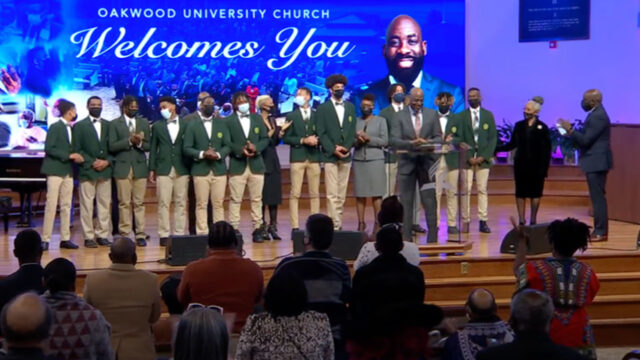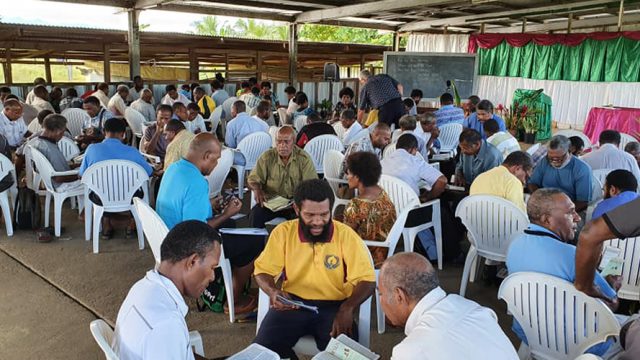Collaborating with supporting ministries

During the past 30 years I’ve had a chance to serve in different capacities at home and overseas in a variety of contexts. I saw that when members work together as a team, more is accomplished for the kingdom of God. What do I mean by that? Well, let’s look at a biblical example.
Jesus took His disciples on a field trip, and they passed by an individual who was not one of the twelve but who was a follower of Christ. He was casting demons out in Jesus’ name. The disciples came to Jesus and said, “Master, You need to stop that man because he is not part of our group” (see Luke 9:49). The disciples had a closed mindset. In their view they were the only ones who could play the game or be involved in ministry with Jesus. But in His response to the disciples, Jesus expanded their definition of who is on the team. He said, “Do not forbid him, for he who is not against us is on our side” (verse 50; cf. Mark 9:38, 39).
Jesus’ idea of the team was bigger than what the disciples held in their limited view. They thought they were the only ones who could serve God. Other Bible examples reveal that Jesus had an expanded view of mission that incorporated a variety of individuals, including tax collectors, Pharisees, Canaanites, and others in addition to the disciples who traveled with Him every day.
Three Lessons
There are three lessons I’ve learned from working with supporting ministries for the sake of expanding the kingdom of God.
Each one has a distinct calling and role to play in the advancement and sharing of the three angels’ messages. The role and function of ministries that support the mission of the Seventh-day Adventist Church is to follow their calling as they are convicted, within their legal framework in the city, state, or country in which they operate, to help make disciples among unreached people groups. This is done in support of the mission of and in concert with the Seventh-day Adventist Church.
As we look to church history, we see gospel work being done in New York City in the late 1890s to early 1900s. Some of the entities or ministry partners involved were Adventist businessmen and entrepreneurs, not paid employees of the denomination. They were part of the same team of sharing Christ in the city and making disciples within the working class, amid the stockbrokers on Wall Street, and among the unreached people groups of that day.
The church normally focuses on preaching the gospel, teaching, health ministry, and helping ministries such as caring for the widows, orphans, and those with special needs. Sometimes we get distracted, however. That’s where the second step comes into play.
We’re better together because we complement each other’s work. Some entities may view supporting ministries as competition. I know that at times there have been conflicts and misunderstandings that have caused distrust, confusion, and a lack of unity between the supporting ministry and an established denominational entity such as a local church, conference, union, division, or even the General Conference.
But if we look at Ephesians 4 and see how God has equipped all believers using spiritual gifts, we see that there can be a complementary role for supporting ministries in areas and among ethnic groups where the church does not have an active presence. We are better together.
We need to know our roles. What do I mean? As a Seventh-day Adventist pastor, missionary, church planter, and advocate, I work with and am a part of the boards of different church entities. That includes the local church where I am a member, my local conference, perhaps the union or even my division or General Conference. At those representation levels I can have a voice, vote on issues, give guidance and direction, and be part of a process. It is there that I make my contribution as a church leader.
So how do church leaders or employees interface with those who have supporting ministries? Working within our respective roles, we can communicate with each other. What are the mission challenges before us? Which ones remain? We can pray together to ask God to guide, inspire, and ignite the hearts of women, men, entrepreneurs, and young adults who are called by Him, gifted, financed, and equipped by Him in ways other than through the denomination. So we interface through communication, strategizing, and prayer.
Another way we work within our distinct roles is through collaboration. Part of that collaboration is asking, “What is the need and how can we work together?”—each one within its own legal framework and entity. There can be a cooperative spirit between the two for the furtherance of the mission, not one trying to control the other, respecting the legal boundaries within which each operates. It’s done best when we work together and support each other.
Advancing the Work
In the General Conference Working Policy there is a dedicated section* on supporting ministries and how they are defined. There is a process by which supporting, independent, separate legal bodies (or nonprofit organizations in the United States) can work in conjunction with the church in its mission work, but within the context that each one has.
In some of the veiled cities (metropolitan areas around the world where mission must be treated sensitively) I saw how God used different entities to help reach some of the unreached people groups the denomination could not reach.
Let me explain. In today’s mission context there are some places where they say, “Missionary, go home.” I, as an ordained minister, would not be welcome there. God has given many gifts to His body, however, and the pastoral role is one that can be shared. It’s not the only gift. There are the gifts of help and healing, too. One who has those skills or abilities, as well as credentials from their training, can work in cross-cultural settings that I would not be permitted in. This is how the church and supporting ministries can work collaboratively, to pursue the mission of the church, not for the sake of controlling one another, but for using our spiritual gifts and demonstrating our divine calling to make disciples and build up the body of Christ.
So how big is your team? It takes all of us working together to fulfill the mission we’ve been given—to provide hope and healing to a world shrouded in pain and darkness. We must exhibit a spirit of cooperative awareness and respect for the variety of gifts and callings the Lord has laid on each of us, working together to advance the kingdom of heaven.
* Working Policy of the General Conference of Seventh-day Adventists (Nampa, Idaho: Pacific Press Pub. Assn., 2022), p. 473.







